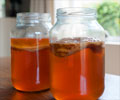A Dutch university warned Wednesday against using probiotic bacteria to treat patients with acute pancreatitis, after an experiment using these microbes showed high mortality rates.
A Dutch university warned Wednesday against using probiotic bacteria to treat patients with acute pancreatitis, after an experiment using these microbes showed high mortality rates.
In a clinical study conducted among 296 patients between 2004-2005, volunteers were given either probiotic bacteria or a placebo, the University Medical Centre (UMC) in Utrecht said in a press release.Twenty-four people died in the study -- an overall figure that tallies with previous work involving patients with this life-threatening condition.
However, nine occurred in the placebo group, but 24 occurred in the probiotics group.
The UMC could not be reached for comment as to which strain of bacteria was used in the treatment.
In the experiment, the researchers added probiotics to the patients' dripfeed "in the expectation that it would boost the body's resistance to harmful bacteria", the UMC said in its press release.
However, the outcome was "dramatically different from what was expected", a UMC spokeswoman told the Netherlands' ANP news agency separately.
Advertisement
"The exact cause of the deaths is under investigation," it said, adding though that post-mortems had ruled out any possibility that the probiotics caused infection.
Advertisement
Pancreatitis occurs from damage to the pancreas, a key enzyme-making organ of the digestive system that lies just below the stomach.
In its "severe acute" form, pancreatis can have a very high mortality rate if the pancreatic tissue dies and becomes infected, and antibiotics and anti-inflammatories typically have litte effect.
Previous research has been conducted in several countries to see whether probiotics -- live micro-organisms often called "friendly" germs -- can help.
Source-AFP
LIN / LIN











